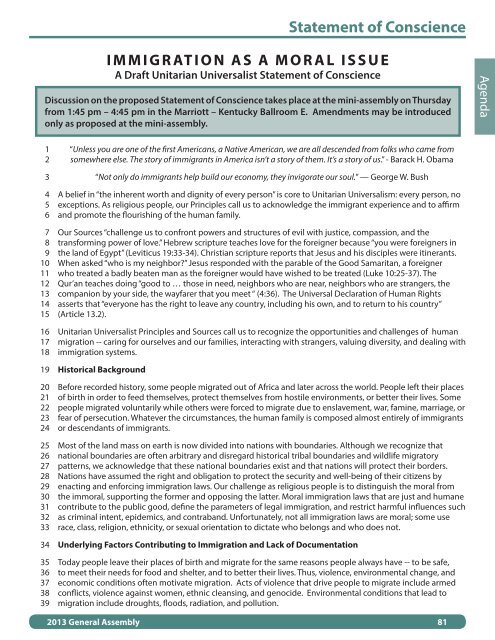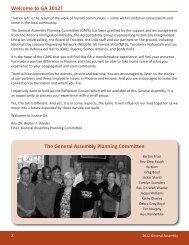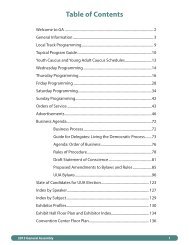Topical Program Guide - Unitarian Universalist Association of ...
Topical Program Guide - Unitarian Universalist Association of ...
Topical Program Guide - Unitarian Universalist Association of ...
Create successful ePaper yourself
Turn your PDF publications into a flip-book with our unique Google optimized e-Paper software.
Statement <strong>of</strong> ConscienceIMMIGRATION AS A MORAL ISSUEA Draft <strong>Unitarian</strong> <strong>Universalist</strong> Statement <strong>of</strong> ConscienceDiscussion on the proposed Statement <strong>of</strong> Conscience takes place at the mini-assembly on Thursdayfrom 1:45 pm – 4:45 pm in the Marriott – Kentucky Ballroom E. Amendments may be introducedonly as proposed at the mini-assembly.Agenda123456789101112131415161718192021222324252627282930313233343536373839“Unless you are one <strong>of</strong> the first Americans, a Native American, we are all descended from folks who came fromsomewhere else. The story <strong>of</strong> immigrants in America isn’t a story <strong>of</strong> them. It’s a story <strong>of</strong> us.” - Barack H. Obama“Not only do immigrants help build our economy, they invigorate our soul.” — George W. BushA belief in “the inherent worth and dignity <strong>of</strong> every person” is core to <strong>Unitarian</strong> Universalism: every person, noexceptions. As religious people, our Principles call us to acknowledge the immigrant experience and to affirmand promote the flourishing <strong>of</strong> the human family.Our Sources “challenge us to confront powers and structures <strong>of</strong> evil with justice, compassion, and thetransforming power <strong>of</strong> love.” Hebrew scripture teaches love for the foreigner because “you were foreigners inthe land <strong>of</strong> Egypt” (Leviticus 19:33-34). Christian scripture reports that Jesus and his disciples were itinerants.When asked “who is my neighbor?” Jesus responded with the parable <strong>of</strong> the Good Samaritan, a foreignerwho treated a badly beaten man as the foreigner would have wished to be treated (Luke 10:25-37). TheQur’an teaches doing “good to … those in need, neighbors who are near, neighbors who are strangers, thecompanion by your side, the wayfarer that you meet “ (4:36). The Universal Declaration <strong>of</strong> Human Rightsasserts that “everyone has the right to leave any country, including his own, and to return to his country”(Article 13.2).<strong>Unitarian</strong> <strong>Universalist</strong> Principles and Sources call us to recognize the opportunities and challenges <strong>of</strong> humanmigration -- caring for ourselves and our families, interacting with strangers, valuing diversity, and dealing withimmigration systems.Historical BackgroundBefore recorded history, some people migrated out <strong>of</strong> Africa and later across the world. People left their places<strong>of</strong> birth in order to feed themselves, protect themselves from hostile environments, or better their lives. Somepeople migrated voluntarily while others were forced to migrate due to enslavement, war, famine, marriage, orfear <strong>of</strong> persecution. Whatever the circumstances, the human family is composed almost entirely <strong>of</strong> immigrantsor descendants <strong>of</strong> immigrants.Most <strong>of</strong> the land mass on earth is now divided into nations with boundaries. Although we recognize thatnational boundaries are <strong>of</strong>ten arbitrary and disregard historical tribal boundaries and wildlife migratorypatterns, we acknowledge that these national boundaries exist and that nations will protect their borders.Nations have assumed the right and obligation to protect the security and well-being <strong>of</strong> their citizens byenacting and enforcing immigration laws. Our challenge as religious people is to distinguish the moral fromthe immoral, supporting the former and opposing the latter. Moral immigration laws that are just and humanecontribute to the public good, define the parameters <strong>of</strong> legal immigration, and restrict harmful influences suchas criminal intent, epidemics, and contraband. Unfortunately, not all immigration laws are moral; some userace, class, religion, ethnicity, or sexual orientation to dictate who belongs and who does not.Underlying Factors Contributing to Immigration and Lack <strong>of</strong> DocumentationToday people leave their places <strong>of</strong> birth and migrate for the same reasons people always have -- to be safe,to meet their needs for food and shelter, and to better their lives. Thus, violence, environmental change, andeconomic conditions <strong>of</strong>ten motivate migration. Acts <strong>of</strong> violence that drive people to migrate include armedconflicts, violence against women, ethnic cleansing, and genocide. Environmental conditions that lead tomigration include droughts, floods, radiation, and pollution.2013 General Assembly 81






